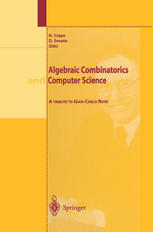

Most ebook files are in PDF format, so you can easily read them using various software such as Foxit Reader or directly on the Google Chrome browser.
Some ebook files are released by publishers in other formats such as .awz, .mobi, .epub, .fb2, etc. You may need to install specific software to read these formats on mobile/PC, such as Calibre.
Please read the tutorial at this link: https://ebookbell.com/faq
We offer FREE conversion to the popular formats you request; however, this may take some time. Therefore, right after payment, please email us, and we will try to provide the service as quickly as possible.
For some exceptional file formats or broken links (if any), please refrain from opening any disputes. Instead, email us first, and we will try to assist within a maximum of 6 hours.
EbookBell Team

4.0
6 reviewsThis book, dedicated to the memory of Gian-Carlo Rota, is the result of a collaborative effort by his friends, students and admirers. Rota was one of the great thinkers of our times, innovator in both mathematics and phenomenology. I feel moved, yet touched by a sense of sadness, in presenting this volume of work, despite the fear that I may be unworthy of the task that befalls me. Rota, both the scientist and the man, was marked by a generosity that knew no bounds. His ideas opened wide the horizons of fields of research, permitting an astonishing number of students from all over the globe to become enthusiastically involved. The contagious energy with which he demonstrated his tremendous mental capacity always proved fresh and inspiring. Beyond his renown as gifted scientist, what was particularly striking in Gian-Carlo Rota was his ability to appreciate the diverse intellectual capacities of those before him and to adapt his communications accordingly. This human sense, complemented by his acute appreciation of the importance of the individual, acted as a catalyst in bringing forth the very best in each one of his students. Whosoever was fortunate enough to enjoy Gian-Carlo Rota's longstanding friendship was most enriched by the experience, both mathematically and philosophically, and had occasion to appreciate son cote de bon vivant. The book opens with a heartfelt piece by Henry Crapo in which he meticulously pieces together what Gian-Carlo Rota's untimely demise has bequeathed to science.